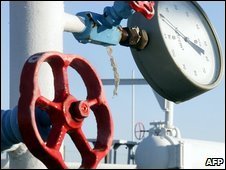| ||||||||||||||||||||||||||||||||||||||||||||||||
|
Four European countries are meeting in Turkey to sign a five-nation agreement for the long-planned 3,300km Nabucco natural gas pipeline1. 四个欧洲国家在土耳其会晤,签署一条长期的长达3300千米的纳布科天然气管道协议。 Once completed, the line will bring up to 31 billion cubic metres of gas a year from the Caspian and the Middle East across Turkey and into Europe. It will give an important alternative energy supply to Russia, which already meets 30% of Europe's gas needs. But much still remains2 to be agreed on, not least where the gas will come from. The five countries - Turkey, Romania, Bulgaria(保加利亚), Hungary(匈牙利) and Austria(奥地利) - have been working on the Nabucco project with the European Commission3 for seven years now. But still the decision to sign the heads of government agreement on 13 July has come as a surprise. To begin with there is still no clear idea as to what has been agreed. Turkey and the European Commission are still at loggerheads(不和) over how much gas Turkey will be able to take from the line, with Ankara claiming that it might be another six months before a final agreement is reached. More worrying still, Nabucco still has no guaranteed supply of gas. Iran, Iraq, Kazakhstan, Turkmenistan and Egypt are all considered potential suppliers in the long term. Currently4 though, only Azerbaijan is in a position to supply the 15 billion cubic metres a year the line needs if it is to be constructed as planned by 2014. But two weeks ago, Baku agreed to sell some of that gas to Russia, a move many understood as a warning to the Nabucco partners to sort out their differences or look elsewhere5. In the same way, Monday's signing ceremony is being seen as largely6 an attempt to persuade Baku that the Nabucco partners can reach an agreement, on some issues at least. 点击  收听单词发音 收听单词发音
|
||||||||||||||||||||||||||||||||||||||||||||||||
- 发表评论
-
- 最新评论 进入详细评论页>>




